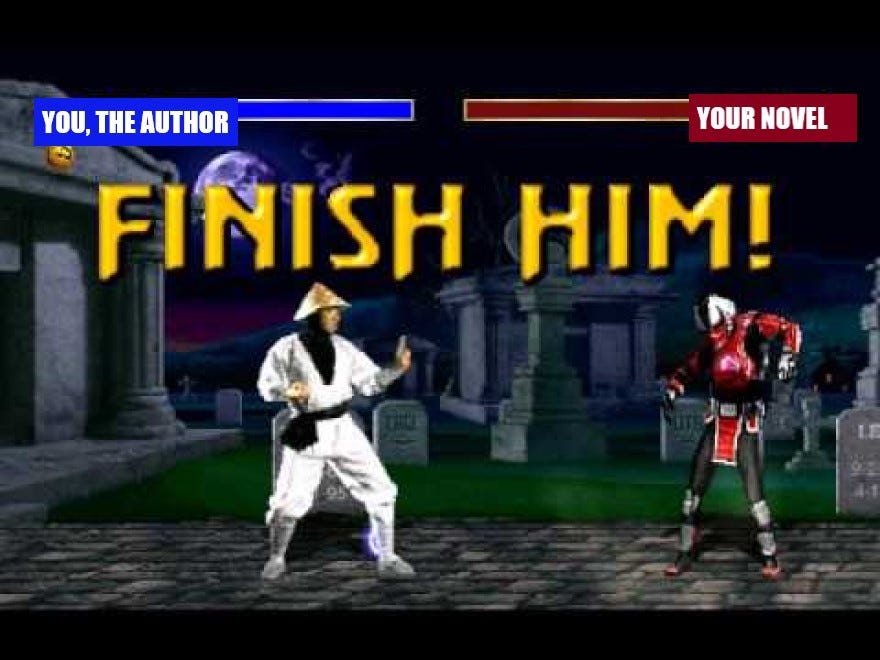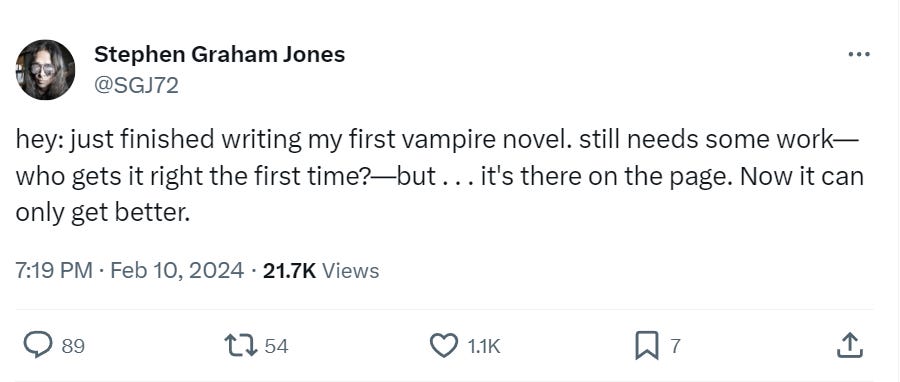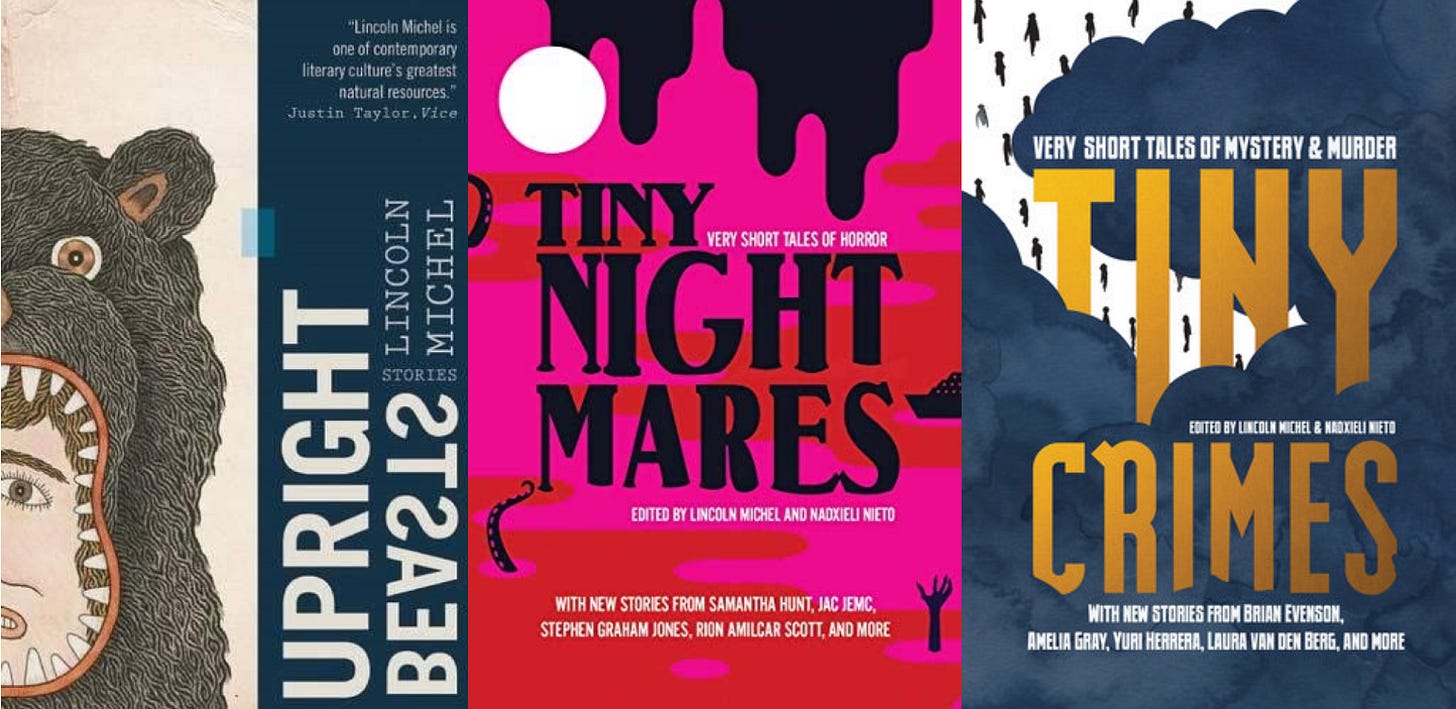The First and Best Writing Advice I Ever Received
Finish things. Just finish. Really, finish them!
Whenever I’m asked for the single best piece of writing advice, I always answer with two words: “Finish things.” This is the best writing advice I was given but also more or less the first writing advice I ever received.
In college, I had a friend whose father was an established author and was passing through the city for a festival. He took a few of us out to dinner on the publisher’s dime—this used to be common, believe it or not—along with his agent and a few other people. I didn’t get to speak to him much, but at some point my friend somewhat jokingly said, “Dad, my buddy Lincoln here wants to be a writer.” The author turned to me with that weary uh-oh-you’re-in-for-a-tough-life-get-out-if-you-can expression authors tend to use in these situations and said simply, “Make sure to finish things.” Then he turned back to chatting with his agent.
The longer I’ve been a writer—and the longer I’ve been a writing professor—the more I realize this is the most useful advice. Yes, it’s basic. The best advice tends to be. There’s no magical secret out there. You have to do the work, which means you have to finish the work.
Finish things. Finish a story, then move onto the next. Finish a draft of a novel, then move onto the next draft. Finish the book and start the next. Finish. Just finish! If you can’t finish, you can’t get anywhere.
Young writers understandably worry about querying agents, submitting to editors, publicity, and all the rest. None of that will happen unless you first finish something. There is no point in worrying about your book tour if you haven’t written a book or fretting about what magazines to submit your poems to if you have no poems to submit.
Again, this is obvious, but it is a hard lesson to learn. I’ve seen countless books die on the vine because the writer spends forever tinkering and toying. This is especially dangerous at the early stages of a project when you have to make the hard decisions that fix much of the novel in place. Should it be in first person or third? What’s the style? Genre? Structure? I’ve had many friends and students who get stuck here. They rewrite the opening chapter in a different POV. They switch genres and start again. Etc. It can be hard to make these decisions. It’s fun and safe to play around in the early draft stages, frolicking in the open untouched fields that no one will see (and thus be able to judge you by). But at some point you have to fence off an area. Lay a foundation. Build the actual house. At least if you want it to be read by anyone else.
If you are, like me, an ADHD-brain writer who always has a dozen projects they’re thinking about, there is nothing more dangerous than forever jumping between them and never finishing any. At some point, you have to pick one and finish. This is certainly what I had to do with my first novel The Body Scout and with the second novel I recently sold. Both times, I had several ideas for novels I was tinkering with and had to force myself to pick one and just finish the damn thing.
MFA programs and creative writing classes can be dangerous here. Workshopping the start of a novel, for example, means getting conflicting feedback on a work you yourself may not fully understand. (You can never understand a work fully until you finish a draft and see its entire shape.) It’s tempting to try and “fix” the opening with the feedback you get. Don’t. The start of a novel is—in my experience—the most likely to change by the time you finish. You can waste years polishing a first chapter that might have to get jettisoned entirely once you reach the end and realize, oh, that character had to be cut and this plotline had to change and the opening scene now has no thematic resonance with what the book became. Whenever I read a student thesis I always tell them to ignore all the advice and feedback I’m giving them until after they’ve completed a first draft. Then go back and see what still applies.
Finishing means failing. If you always stay in the drafting stage, success—however you define it—is always on the horizon. But failing is how we teach ourselves to write. You have to write a lot of bad poems to write a good one. Nearly every novelist has “trunk novels” they’ve abandoned, yet which taught them how to write the novel they did publish. And every book goes through many drafts before it is finished.
Indeed, when it comes to books it is useful to remember that finishing is a multi-stage process. You have to finish a draft to submit to your agent. Then you’ll get notes and have to finish another draft to submit to editors. Rinse and repeat. Although, yes, at some point the finishing is finished and the book has to be done.
At the top of this thread, I linked to a Twitter discussion of writing advice. The algorithm showed me this Tweet below my own:
Stephen Graham Jones puts it well. It may be scary to finish a finish a draft. But it can only get better from there. Finishing is the first step, even if it’s also the next step, and the next, and the next.
And I need a way to finish this post—especially since I have my own novel revision to finish—so I might as well end here.
If you like this newsletter, consider subscribing or checking out my recent science fiction novel The Body Scout that The New York Times called “Timeless and original…a wild ride, sad and funny, surreal and intelligent.”
Other works I’ve written or co-edited include Upright Beasts (my story collection), Tiny Nightmares (an anthology of horror fiction), and Tiny Crimes (an anthology of crime fiction).






I wrote a really bad novel during lockdown. When I told to my then therapist, I described it as a cheese full of holes and it had plenty of mistakes. She said, "Well, but you have cheese".
Since then I think of any finished draft as cheese.
Oomph, needed to hear this today. I can get a draft down easy enough, it's the editing that sucks and pulls me under, like quicksand. Thanks for the reminder to just get shit done 👍